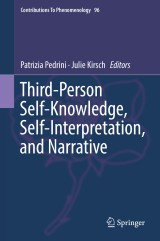Details

Third-Person Self-Knowledge, Self-Interpretation, and Narrative
Contributions To Phenomenology, Band 96
|
128,39 € |
|
| Verlag: | Springer |
| Format: | |
| Veröffentl.: | 27.11.2018 |
| ISBN/EAN: | 9783319986463 |
| Sprache: | englisch |
Dieses eBook enthält ein Wasserzeichen.
Beschreibungen
<p></p><p>This volume answers questions that lead to a clearer picture of third-person self- knowledge, the self-interpretation it embeds, and its narrative structure. Bringing together current research on third-person self-knowledge and self-interpretation, the book focuses on third-person self-knowledge, and the role that narrative and interpretation play in acquiring it. It regards the third-personal epistemic approach to oneself as a problem worthy of investigation in its own right, and makes clear the relation between third-person self-knowledge, self-interpretation, and narrative capacities.</p>
<p>In recent years, the idea that each person is in a privileged position to acquire knowledge about her own mental states has come under attack. A growing body of empirical research has cast doubt upon the existence of what philosophers call ‘first person self-knowledge’, i.e., knowledge about our mental states that is often thought to be immediate, transparent, and authoritative. Thisline of thought has led some philosophers to claim that what seems to be ‘first-person self-knowledge’ is really just ‘third-person self-knowledge,’ i.e., knowledge about our mental states that is inferential, opaque, and fallible. This book discusses challenges for first-person knowledge and explores the true nature of third-person knowledge.</p>
<p> </p><br><p></p>
<p>In recent years, the idea that each person is in a privileged position to acquire knowledge about her own mental states has come under attack. A growing body of empirical research has cast doubt upon the existence of what philosophers call ‘first person self-knowledge’, i.e., knowledge about our mental states that is often thought to be immediate, transparent, and authoritative. Thisline of thought has led some philosophers to claim that what seems to be ‘first-person self-knowledge’ is really just ‘third-person self-knowledge,’ i.e., knowledge about our mental states that is inferential, opaque, and fallible. This book discusses challenges for first-person knowledge and explores the true nature of third-person knowledge.</p>
<p> </p><br><p></p>
Introduction, by Patrizia Pedrini and Julie Kirsch.- Chapter 1. “Self-Knowing Interpreters vs. Self-Knowing Subjects,” by Annalisa Coliva.- Chapter 2. “Self-Defence and Self-Knowledge: Truth and Interpretation in Psychoanalysis,” by Michael Lacewing.- Chapter 3. “Self-Interpretation, Narrative, and Intersubjectivity,” by Shaun Gallagher.- Chapter 4. “Knowing Our Minds: What and How?”, by Daniel Hutto and Patrick McGivern.- Chapter 5. “Introspection, Introjection and Interpersonal Understanding: The Phenomenological Approach,” by Dermot Moran.- Chapter 6. “Hermeneutics, Third-Person Self-Interpretation, and Narrative,” by Bruce B. Janz.- Chapter 7. “How do Narratives Spin the Self? Implications for Self-Knowledge,” by Serife Tekin.- Chapter 8. “Self-Interpretations as Software: Toward a New Understanding of Why False Self-Conceptions Persist,” by Tad Zawidski.- Chapter 9. “Interpreting Intuitions,”; by Neil Van Leeuwen and Marcus McGahhey.- Chapter 10: “Interpreting Things Past,” by Julie Kirsch.- Chapter 11: “Close Cover: Practical Knowledge and Retrospective Assessment,” by Carla Bagnoli.- Chapter 12: “Self-Knowledge, Mental Time Travel, and Agency,” by Luca Malatesti and Filip Cec.- Chapter 13: “Alienation, Identification, and Self-Knowledge,” by Matthew Parrott.- Chapter 14: “Conceptualizing of One’s Inner Experience,” by Patrizia Pedrini.- Chapter 15: “Extended Knowledge and Self-Knowledge,” Duncan Prichard and Adam Carter.<br>
<div><p><b>Patrizia Pedrini </b>is Fixed-term Research Fellow at the Department of Letters and Philosophy, University of Florence, Italy. She is habilitated as Associate Professor in Theoretical Philosophy. Her main research interests range fromphilosophy of mind, philosophy of psychiatry, moral psychology, to epistemology. She is the author of two monographic books in Italian, one on self-knowledge (Prima persona. Epistemologia dell’autoconoscenza, Pisa, ETS, 2009) and one on self-deception (L’autoinganno. Che cos’è e come funziona, Roma-Bari, Laterza, 2013). She wrote articles in Italian and English on topics at the boundaries between philosophy, psychology, psychiatry, moral psychology, epistemology. Her recent publications include “Rescuing the ‘Loss-of-Agency’ Account of Thought Insertion” (Philosophy, Psychiatry, & Psychology, 2015, with replies to commentaries). She is currently working on an authored book in English on self-deception.</p><p><b>Julie E. Kirsch</b> is an assistant professor of Philosophy at D’Youville College in Buffalo, New York. Her current research focuses upon self-knowledge and the ethics of belief and memory. She became interested in these problems after investigating the nature and ethics of self-deception in her earlier work. Her recent publications include Is Abortion a Question of Personal Morality? (2013), Narrative and Self- Deception in La Symphonie Pastorale (2012), When Is Ignorance Morally Objectionable? (2011), Maladies of Fantasy and Depth (2009), and What’s So Great about Reality? (2005). </p>
<p> </p><br></div>
<p> </p><br></div>
This volume answers questions that lead to a clearer picture of third-person self- knowledge, the self-interpretation it embeds, and its narrative structure. Bringing together current research on third-person self-knowledge and self-interpretation, the book focuses on third-person self-knowledge, and the role that narrative and interpretation play in acquiring it. It regards the third-personal epistemic approach to oneself as a problem worthy of investigation in its own right, and makes clear the relation between third-person self-knowledge, self-interpretation, and narrative capacities.<p>In recent years, the idea that each person is in a privileged position to acquire knowledge about her own mental states has come under attack. A growing body of empirical research has cast doubt upon the existence of what philosophers call ‘first person self-knowledge’, i.e., knowledge about our mental states that is often thought to be immediate, transparent, and authoritative. This line of thoughthas led some philosophers to claim that what seems to be ‘first-person self-knowledge’ is really just ‘third-person self-knowledge,’ i.e., knowledge about our mental states that is inferential, opaque, and fallible. This book discusses challenges for first-person knowledge and explores the true nature of third-person knowledge.</p>
It brings together research on third-person self-knowledge and self-interpretation in book form It investigates the narrative structure that self-interpretation takes It includes a Preface inviting cooperation between analytic philosophy and phenomenology about issues regarding self-knowledge

















